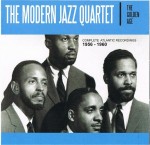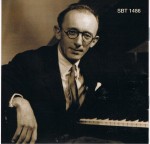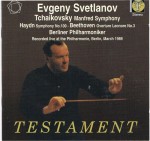 To paraphrase Clara’s lullaby in Porgy and Bess, summertime and the listening is easy. How much easier and “cool” could it get than listening to the original performances of the legendary Modern Jazz Quartet, particularly their early recordings from 1956 through 1960? The group came together in 1952 with pianist and leader John Lewis, vibraphonist Milt Jackson, bassist Percy Heath and (from 1955) percussionist Connie Kay. Their complete Atlantic recordings can be found a new four-disc set for about the price of one CD (Enlightenment EN4CD 9008). The 52 tracks include some 20 popular ballads, many jazz classics and original material. The first CD is monaural, the rest in stereo.
To paraphrase Clara’s lullaby in Porgy and Bess, summertime and the listening is easy. How much easier and “cool” could it get than listening to the original performances of the legendary Modern Jazz Quartet, particularly their early recordings from 1956 through 1960? The group came together in 1952 with pianist and leader John Lewis, vibraphonist Milt Jackson, bassist Percy Heath and (from 1955) percussionist Connie Kay. Their complete Atlantic recordings can be found a new four-disc set for about the price of one CD (Enlightenment EN4CD 9008). The 52 tracks include some 20 popular ballads, many jazz classics and original material. The first CD is monaural, the rest in stereo.
Their justly acclaimed music-making, the rage of the day, was polished and instantly recognizable, vitalized and inspired by John Lewis’ leadership. This was the era of the birth of “cool jazz” that was to eclipse the blatant bebop era which had run its course. There are 52 tracks in this set with no duds. Aficionados of this group may have a four-CD set with 54 tracks of pre-1955 MJQ recordings for Pablo and Prestige (Fantasy 4PRCD 4438). That set has a few tracks with Kenny Clarke who was replaced by Connie Kay.
 In my experience, listening to the playing of Clifford Curzon in his chosen repertoire presents a very special, if not unique opportunity to get beyond the notes in the score into an intangible communication from the composer through the performer. Such a performance is that of Mozart’s Piano Concerto No.27, K595, recorded live in the Royal Albert Hall on September 6, 1961 by the BBC. That is on a CD from Testament (SBT 1486, mono), together with the four Schubert Impromptus D899 live from a recital in Usher Hall, Edinburgh a few days earlier. Adrian Boult conducting the London Philharmonic is totally simpatico with Curzon in this inspired Mozart performance. The Impromptus, and the third of the Moments Musicaux D870, are characteristic of Curzon’s renowned understanding and communication of Schubert. This is a disc you may happily set your player to repeat all.
In my experience, listening to the playing of Clifford Curzon in his chosen repertoire presents a very special, if not unique opportunity to get beyond the notes in the score into an intangible communication from the composer through the performer. Such a performance is that of Mozart’s Piano Concerto No.27, K595, recorded live in the Royal Albert Hall on September 6, 1961 by the BBC. That is on a CD from Testament (SBT 1486, mono), together with the four Schubert Impromptus D899 live from a recital in Usher Hall, Edinburgh a few days earlier. Adrian Boult conducting the London Philharmonic is totally simpatico with Curzon in this inspired Mozart performance. The Impromptus, and the third of the Moments Musicaux D870, are characteristic of Curzon’s renowned understanding and communication of Schubert. This is a disc you may happily set your player to repeat all.
 Another CD set from Testament documents the only encounter between the Berlin Philharmonic Orchestra and Russian conductor Evgeny Svetlanov (SBT2 1481, 2 CDs). By 1989, Karajan was well out of the picture and the orchestra was now free to engage conductors who may or may not have formerly pleased him. Svetlanov, the sixty-year-old Russian conductor, was highly regarded world-wide and his appearance before this legendary Berlin orchestra was more than simply an engagement. It was an event. There were only two performances and Testament has released the Rundfunk Berlin-Brandenburg’s in-concert recording of March 4, 1989 from the Philharmonie, eight months before the fall of the Berlin Wall. Svetlanov’s well chosen repertoire was Beethoven’s Leonora Overture No.3, Haydn’s Symphony No.100 (the “Military”) and Tchaikovsky’s Manfred Symphony, Op.58.
Another CD set from Testament documents the only encounter between the Berlin Philharmonic Orchestra and Russian conductor Evgeny Svetlanov (SBT2 1481, 2 CDs). By 1989, Karajan was well out of the picture and the orchestra was now free to engage conductors who may or may not have formerly pleased him. Svetlanov, the sixty-year-old Russian conductor, was highly regarded world-wide and his appearance before this legendary Berlin orchestra was more than simply an engagement. It was an event. There were only two performances and Testament has released the Rundfunk Berlin-Brandenburg’s in-concert recording of March 4, 1989 from the Philharmonie, eight months before the fall of the Berlin Wall. Svetlanov’s well chosen repertoire was Beethoven’s Leonora Overture No.3, Haydn’s Symphony No.100 (the “Military”) and Tchaikovsky’s Manfred Symphony, Op.58.
The familiar Beethoven enjoys a strong and expressive performance and the Haydn is refreshingly alive, played with charm and style, a tantalizing taste of what further association between this conductor and orchestra could have produced.
Tchaikovsky seriously did not wish to compose a work based on Manfred, Byron’s metaphysical drama. “When I compose a programmatic symphony I constantly have the feeling that I am cheating the listener in that I am paying not with gold but with worthless paper rubles.” Is it any surprise then that Tchaikovsky vacillated in his estimation of his 1885 four-movement Manfred Symphony? In 1886 in a letter to Nadezhda von Meck, his long time benefactress, he was full of praise, stating that this was his best symphony. That was before his Fifth (1888). Later, in 1888 in a letter to The Grand Duke Constantine he wrote, “Manfred is a ghastly work; I absolutely detest it, with the exception of the first movement. With the publisher’s permission I will destroy the other three movements; they are not worth much, especially the finale. The work is much too long for a symphony; I will make a symphonic poem out of it. It is only then that Manfred, presumably, will find applause.” That didn’t happen. Svetlanov lavishes all the care and attention on this performance as if it were Tchaikovsky’s best.
I first heard Manfred on the 1949 Victor recording of a blazing version conducted by Toscanini and to this day it remains my benchmark performance. As Toscanini had done, Svetlanov makes several cuts and additions throughout, tightening this sometimes loose work. He also reworks the symphony’s closing to repeat the first movement’s impassioned outburst, with added tam-tams (gongs?) ablazing. Svetlanov’s taut reading, attentive to every detail, is outstanding and the memorable virtuosity and polish of the orchestra at that time is heard in full and vivid sound.
Altogether, this is an outstanding release of a deservedly memorable musical event.
Again this year I will enjoy a sojourn in Cooperstown, New York to attend the operas and related events at the nearby Glimmerglass Opera. This year, from July 6 to August 24, they will honour the bi-centennials of Wagner and Verdi with performances of Der Fliegende Holländer and Un Giorno de Regno in a new English translation; plus Camelot and David Lang’s 2008 Pulitzer Prize-winning one-act work, The Little Match Girl Passion, based on the Hans Christian Anderson story and influenced by the format and journey of Bach’s St. Matthew Passion! There is also a worthwhile array of special events, discussions and programs of interest just about every day. Check their website at glimmerglass.org for all you need to know and reservations. In the vicinity are all kinds of restaurants and accommodations from motels to the opulence of the Otesaga Hotel, a magnificent establishment in the grand tradition where anyone may enjoy their incomparable Sunday breakfast or lunch buffet. A comfortable six- to seven-hour drive from Toronto.



